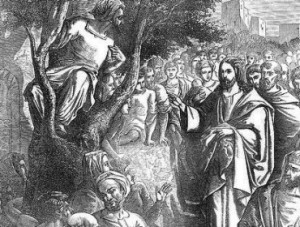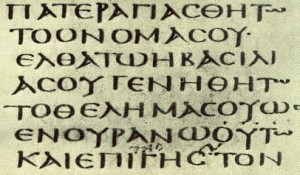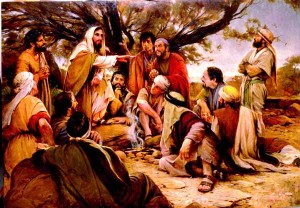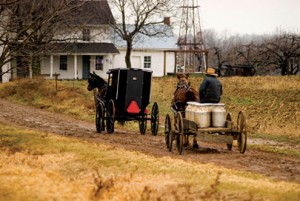From Luke’s Gospel:
As Jesus came near and saw the city, he wept over it, saying, “If you, even you, had only recognized on this day the things that make for peace! But now they are hidden from your eyes. Indeed, the days will come upon you, when your enemies will set up ramparts around you and surround you, and hem you in on every side. They will crush you to the ground, you and your children within you, and they will not leave within you one stone upon another; because you did not recognize the time of your visitation from God.” Then he entered the temple and began to drive out those who were selling things there; and he said, “It is written, “My house shall be a house of prayer’; but you have made it a den of robbers.” Every day he was teaching in the temple. The chief priests, the scribes, and the leaders of the people kept looking for a way to kill him; but they did not find anything they could do, for all the people were spellbound by what they heard.
(From the Daily Office Lectionary – Luke 19:41-48 (NRSV) – December 1, 2012)
 When I was eight years old, my grandparents gave me an illustrated copy of the King James Version of the Holy Bible. More than 50 years later, I still have it. It is rather small, a little bigger than a standard paper-back novel, and has a zippered leather cover. There are perhaps thirty glossy color plates with (one must admit) mediocre depictions of various biblical events. My favorite has always been the depiction of Jesus cleansing the Temple.
When I was eight years old, my grandparents gave me an illustrated copy of the King James Version of the Holy Bible. More than 50 years later, I still have it. It is rather small, a little bigger than a standard paper-back novel, and has a zippered leather cover. There are perhaps thirty glossy color plates with (one must admit) mediocre depictions of various biblical events. My favorite has always been the depiction of Jesus cleansing the Temple.
In that picture (not the picture I’ve appended to this post, I’m sorry to say), Jesus stands like some comic-book superhero, eyes blazing with righteous fury, his hair and the skirts of his robe flaring out as if he were some rapidly pirouetting dancer, arms outstretched, cat-o-nine-tails whipping about his head. Tables are crashing to the ground, animals are scattering, and the money changers and merchants are fleeing in terror. You can almost hear the panicked cries of the animals and the men.
Throughout the years, as I would go to Sunday School (not very often) or take confirmation instruction (required at my parochial high school) or attend college classes on “the bible as literature”, I would use that bible and look at those pictures, especially that one. I couldn’t really relate to the wise and gentle Jesus sitting on a hillside rock preaching the Beatitudes, nor to the suffering victim hanging on the cross under a stormy and darkling sky. But I could relate to the superhero furiously chasing the bad guys out of the Temple.
Many years later, I was practicing law as a trial lawyer and serving as the chancellor of my diocese. An older priest of the church during some council or committee meeting, or perhaps during the annual diocesan convention, in support of some position or other on some important issue of the day made the assertion that, “of course, Jesus never lost his temper.” What? thought I. You’ve got to be kidding! I’d grown up with a picture of a very angry Jesus kicking butt in Jerusalem!
But . . . as the years have passed, I have seen his point. Jesus was angry, but Jesus didn’t lose his temper. To be angry, even demonstrably angry is one thing; to lose one’s temper, however, suggests something more. Consider the synonymous descriptions we use: blow a fuse, fly into a rage, hit the roof, hit the ceiling, have a cow, have a fit, go ballistic, fly off the handle, flip one’s wig, flip one’s lid, blow one’s stack, throw a fit, blow up. They all describe a loss of control.
That’s the point, I believe, my older, more seasoned colleague was making. Jesus was angry, but Jesus was not out of control. Luke does not elaborate in his description of the cleansing of the Temple, nor do Mark or Matthew other than to add that he overturned the merchants’ tables. John, however, has a more interesting description:
In the temple he found people selling cattle, sheep, and doves, and the money changers seated at their tables. Making a whip of cords, he drove all of them out of the temple, both the sheep and the cattle. He also poured out the coins of the money changers and overturned their tables. He told those who were selling the doves, “Take these things out of here! Stop making my Father’s house a marketplace!” (John 2:14-16)
Jesus was angry, but he was not out of control. He did not “lose his temper”. What he did was deliberate and determined. This was an incident of symbolic prophetic action, like Jeremiah breaking a clay pot, Isaiah walking naked through the city, or Hosea marrying a prostitute. This is Jesus very carefully and very consciously acting out the last verse of the prophecy of Zechariah: “There shall no longer be traders in the house of the Lord of hosts on that day.” (Zech. 14:21)
So, after all these years, even though that superhero picture in my illustrated bible remains my favorite, I think the artist was wrong in his or her depiction of Jesus. If I were going to paint that scene now, everything might be the same except for Jesus’ eyes. I would not paint them flashing with terrible, uncontrolled rage; I would show in them the same kind of disappointed, almost sad, displeasure I sometimes saw in my parents’ eyes. That’s the only sort of anger I can imagine Jesus expressing . . . controlled, deliberate, and so very, very disappointed.
====================
A request to my readers: I’m trying to build the readership of this blog and I’d very much appreciate your help in doing so. If you find something here that is of value, please share it with others. If you are on Facebook, “like” the posts on your page so others can see them. If you are following me on Twitter, please “retweet” the notices of these meditations. If you have a blog of your own, please include mine in your links (a favor I will gladly reciprocate). Many thanks!
====================
Father Funston is the rector of St. Paul’s Episcopal Church, Medina, Ohio.

 I know I’ve read this bit of Zechariah before, but I don’t think I’ve ever paid any attention to it. This morning, the image of parents “piercing” their own children who happen to be prophets and that of “the wounds I received in the house of my friends” really hit home! Strife within families and between friends is here the recompense paid by God to false prophets, but it seems to be the lot of the prophet, the priest, or the ardent advocate in any age. I am reminded of Jesus’ quoting Micah to the effect that “your enemies are members of your own household.” (Micah 7:6; cf Matt. 10:35-36 and Luke 12:52-53) Speaking on behalf of God or any god or any cause is never easy; it leads to misunderstanding and conflict – just look at what happened in many families during the recently passed political campaigns.
I know I’ve read this bit of Zechariah before, but I don’t think I’ve ever paid any attention to it. This morning, the image of parents “piercing” their own children who happen to be prophets and that of “the wounds I received in the house of my friends” really hit home! Strife within families and between friends is here the recompense paid by God to false prophets, but it seems to be the lot of the prophet, the priest, or the ardent advocate in any age. I am reminded of Jesus’ quoting Micah to the effect that “your enemies are members of your own household.” (Micah 7:6; cf Matt. 10:35-36 and Luke 12:52-53) Speaking on behalf of God or any god or any cause is never easy; it leads to misunderstanding and conflict – just look at what happened in many families during the recently passed political campaigns. Zacchaeus climbs a tree to see Jesus. So today’s reading got me thinking scattered thoughts about trees. The weeping willow in my childhood backyard. The peach and cherry trees in my grandfather’s garden. The pinion pines of my native Nevada. The eucalyptus trees that were everywhere on my college campus. The huge ornamental pepper tree that shaded the first house my wife and I bought. I close my eyes, think of those trees, and I see my parents, my childhood friends, my college roommates. Trees are filled with meaning and memory; they bear the fruits of remembrance.
Zacchaeus climbs a tree to see Jesus. So today’s reading got me thinking scattered thoughts about trees. The weeping willow in my childhood backyard. The peach and cherry trees in my grandfather’s garden. The pinion pines of my native Nevada. The eucalyptus trees that were everywhere on my college campus. The huge ornamental pepper tree that shaded the first house my wife and I bought. I close my eyes, think of those trees, and I see my parents, my childhood friends, my college roommates. Trees are filled with meaning and memory; they bear the fruits of remembrance. Who is you? That’s not a grammatically incorrect question. It’s a deeply important question in our study and understanding of scripture.
Who is you? That’s not a grammatically incorrect question. It’s a deeply important question in our study and understanding of scripture. Do you ever wish someone whom you respect and admire hadn’t said what they said, because what they said is so hard to explain to someone who doesn’t respect and admire them, and what they said just sounds wrong, even to you? Then you know how I feel about the last response of Jesus in this conversation with Peter!
Do you ever wish someone whom you respect and admire hadn’t said what they said, because what they said is so hard to explain to someone who doesn’t respect and admire them, and what they said just sounds wrong, even to you? Then you know how I feel about the last response of Jesus in this conversation with Peter! Today is the last Sunday after Pentecost called “the Feast of Christ the King.” A relatively new feast on the calendar of the church, it was instituted by a 20th Century pope and originally set in late October as a response to the Protestant celebration of “Reformation Sunday” on the Sunday closest to October 31, the anniversary of Luther’s posting on the Wittenburg chapel door. The latter, I would suppose, started with the Lutherans but has spread throughout American Protestantism; I know of Presbyterian, Reformed, UCC, and Methodist churches that mark it. I know of no Episcopal congregations that do so. Episcopalians did take to Christ the King, however, and since Paul VI moved it to the last Sunday of the Christian year, every congregation I’ve been a part of has celebrated it. With the adoption of the Revised Common Lectionary, it is now an official part of our tradition.
Today is the last Sunday after Pentecost called “the Feast of Christ the King.” A relatively new feast on the calendar of the church, it was instituted by a 20th Century pope and originally set in late October as a response to the Protestant celebration of “Reformation Sunday” on the Sunday closest to October 31, the anniversary of Luther’s posting on the Wittenburg chapel door. The latter, I would suppose, started with the Lutherans but has spread throughout American Protestantism; I know of Presbyterian, Reformed, UCC, and Methodist churches that mark it. I know of no Episcopal congregations that do so. Episcopalians did take to Christ the King, however, and since Paul VI moved it to the last Sunday of the Christian year, every congregation I’ve been a part of has celebrated it. With the adoption of the Revised Common Lectionary, it is now an official part of our tradition. Although from a modern perspective, the prayer of the Pharisee is rather bigoted, but we should try to see it from his perspective and from within his culture, which Jesus shares. When we do so, we can see that Jesus is not criticizing the individual, but rather condemning an entire system of religion which divides and categorizes people. Jesus is denouncing any system, religious, social, or political, which separates people on the basis of bigotry and fear.
Although from a modern perspective, the prayer of the Pharisee is rather bigoted, but we should try to see it from his perspective and from within his culture, which Jesus shares. When we do so, we can see that Jesus is not criticizing the individual, but rather condemning an entire system of religion which divides and categorizes people. Jesus is denouncing any system, religious, social, or political, which separates people on the basis of bigotry and fear.
 It may be the United States’ holiday of Thanksgiving Day, but the Daily Office continues at this time of year delivering its message of repentance rather than encouraging thanksgiving. The Old Testament lesson is another from Malachi in which the Lord speaking to the priests says that he has spread dung on their faces and put them out of his presence! The gospel lesson from Luke has Jesus predicting the end of the world. And then there’s this epistle lesson which condemns the wealthy. Just not a lot of giving thanks!
It may be the United States’ holiday of Thanksgiving Day, but the Daily Office continues at this time of year delivering its message of repentance rather than encouraging thanksgiving. The Old Testament lesson is another from Malachi in which the Lord speaking to the priests says that he has spread dung on their faces and put them out of his presence! The gospel lesson from Luke has Jesus predicting the end of the world. And then there’s this epistle lesson which condemns the wealthy. Just not a lot of giving thanks!

